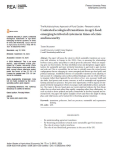Marsden T. (2024). Contested ecological transitions in agri-food: emerging territorial systems in times of crisis and insecurity. REA. Rivista di economia agraria, 30/12/2024, vol. 79, n. 3, p. 69-81.
https://doi.org/10.36253/rea-15421
https://doi.org/10.36253/rea-15421
| Titre : | Contested ecological transitions in agri-food: emerging territorial systems in times of crisis and insecurity (2024) |
| Auteurs : | T. Marsden |
| Type de document : | Article |
| Dans : | REA. Rivista di economia agraria (vol. 79, n. 3, December 2024) |
| Article en page(s) : | p. 69-81 |
| Langues : | Anglais |
| Langues du résumé : | Anglais |
| Catégories : |
Catégories principales 08 - ALIMENTATION ; 8.3 - Politique et Sécurité AlimentaireThésaurus IAMM TRANSITION AGROECOLOGIQUE ; SYSTEME AGROALIMENTAIRE ; SYSTEME DE PRODUCTION LOCALISE ; CRISE ; TERRITOIRE ; EUROPE |
| Résumé : | The paper will assess the extent to which sustainable transitions are occurring with reference to Europe in the 2020’s. Here, re-assessing the relationships between science, policy and politics is critical given the ‘polycrises’ which are impacting upon our food systems. Do these interlinked crises and disruptions suggest opportunities for sustainable and more territorial transitions in agri-food to gain traction and scale out? This is a possibility, but we have to critically assess the revised power configurations that are emerging in a more variegated and diverse agri-food policy and political landscape. Established theories of sustainable transitions need adjusting to take account of a changing science-policy-political landscape, and one which will have to integrate (rather than fragment) the new drivers of net- zero, necessary health and diet shifts, food poverty and security concerns, as well as sustainable and regenerative farming and land-use practices. This gives more opportunity, it will be argued, for integrated territorial management which encourages multi-stakeholder policies and politics. The routes to this are, based upon our recent empirical evidence far from linear; rather they are often inert rather than capable, competing rather than collaborative. As such we need to devise political and policy frameworks at devolved regional and territorial levels. The paper will explore examples of how and where this might be taking place, and what lessons can be learned for re-theorising agrarian transitions. |
| Cote : | En ligne |
| URL / DOI : | https://doi.org/10.36253/rea-15421 |







